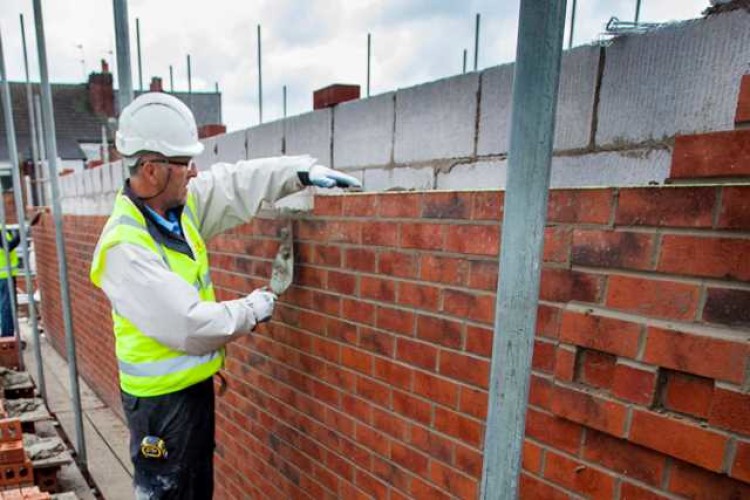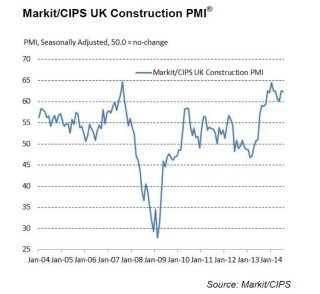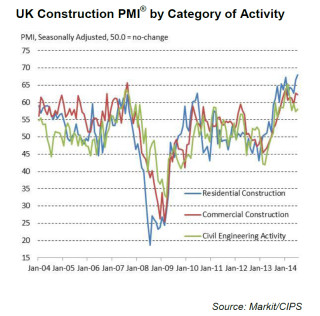Although the pace of expansion moderated slightly from the four-month high recorded in June, growth remains strong. The year-on-year jump in house-building output was the highest seen since November 2013.
The seasonally adjusted Markit/CIPS UK Construction Purchasing Managers’ Index (PMI) registered 62.4 in July, down slightly from 62.6 in June but above the neutral 50.0 mark for the 15th successive month. The score remains one of the highest seen since the summer of 2007. Anecdotal evidence widely cited resurgent demand for construction projects, especially in the housing sector.
Civil engineering activity also expanded at a sharper pace in July, but commercial construction increased at a slower rate in July than had been seen in June.
Higher levels of construction output were supported by a further steep improvement in new business intakes during July. New orders have now increased in every month since May 2013. Survey respondents linked the latest expansion to favourable domestic economic conditions and greater confidence among clients.
The rate of job creation across the construction sector was the fastest since the survey began in April 1997. Anecdotal evidence attributed rising payrolls numbers to increased workloads and ongoing efforts to boost capacity. In some cases, survey respondents noted that staffing levels had been increased in response to concerns about subcontractor availability. The latest survey indicated a reduction in subcontractor availability for the 13th month running, while rates charged by subcontractors increased at a near-survey record pace.
Construction companies indicated another steep increase in purchasing activity during July, thereby extending the current period of expansion to 14 months. Strong demand for construction materials in turn placed additional pressure on suppliers during July, as highlighted by a steep lengthening of vendors’ delivery times. Survey respondents widely commented on low stocks and capacity shortages at suppliers. Meanwhile, average cost burdens increased sharply in July, with the pace of input price inflation easing only slightly from June’s six-month high.

Markit senior economist Tim Moore, the author of the Markit/CIPS Construction PMI, said: “July’s figures suggest the UK construction sector is enjoying its strongest cyclical upswing since the global financial crisis, while a new record rise in employment highlights that construction firms are increasingly confident about the sustainability of the upturn.
“All three core categories of construction activity saw historically steep improvements in output levels through July, unsurprisingly led by a resurgent house building sector.
“Overall the survey adds to the view that construction companies have performed impressively so far this summer, which raises the likelihood that the sands of time could wash away the construction weakness seen in the preliminary second quarter GDP release.
“Looking ahead, a pressing concern for construction companies is the availability of materials and suitably skilled labour to support the recent growth streak. Cuts to supplier capacity have ushered in the worst period of input delivery delays since the survey began in 1997, while this summer has also been notable for construction firms reporting near-record increases in rates commanded for subcontracted work.”
David Noble, chief executive of the Chartered Institute of Purchasing & Supply (CIPS), which sponsors the survey, said: “The house-building sector is racing ahead this quarter with the fastest growth in construction of homes for over a decade. The industry as a whole continued its impressive growth, dipping slightly from last month’s high. The boom in house-building also encouraged the fastest acceleration in employment the index has ever seen over its 17 year history. The commercial and civil engineering sectors also pulled their weight with continued growth, to deliver one of the fastest overall increases in output since 2007.
“One concern however, is the strain on supply chains that could become a roadblock to sustained growth in the future. Construction firms reported the sharpest deterioration in the quality of subcontracted work since 1999, which combined with lengthening supplier delivery times could conspire to put the brakes on the sector’s growth. But there’s evidence that firms are starting to look beyond in-demand sub-contractors and instead further boost their own staffing levels, which goes someway to explaining the record rise in employment levels.
“In the short term at least, the outlook for the coming quarter is strong with the level of new orders continuing to rise and confidence for the year ahead growing steadily since June.”
Got a story? Email news@theconstructionindex.co.uk





